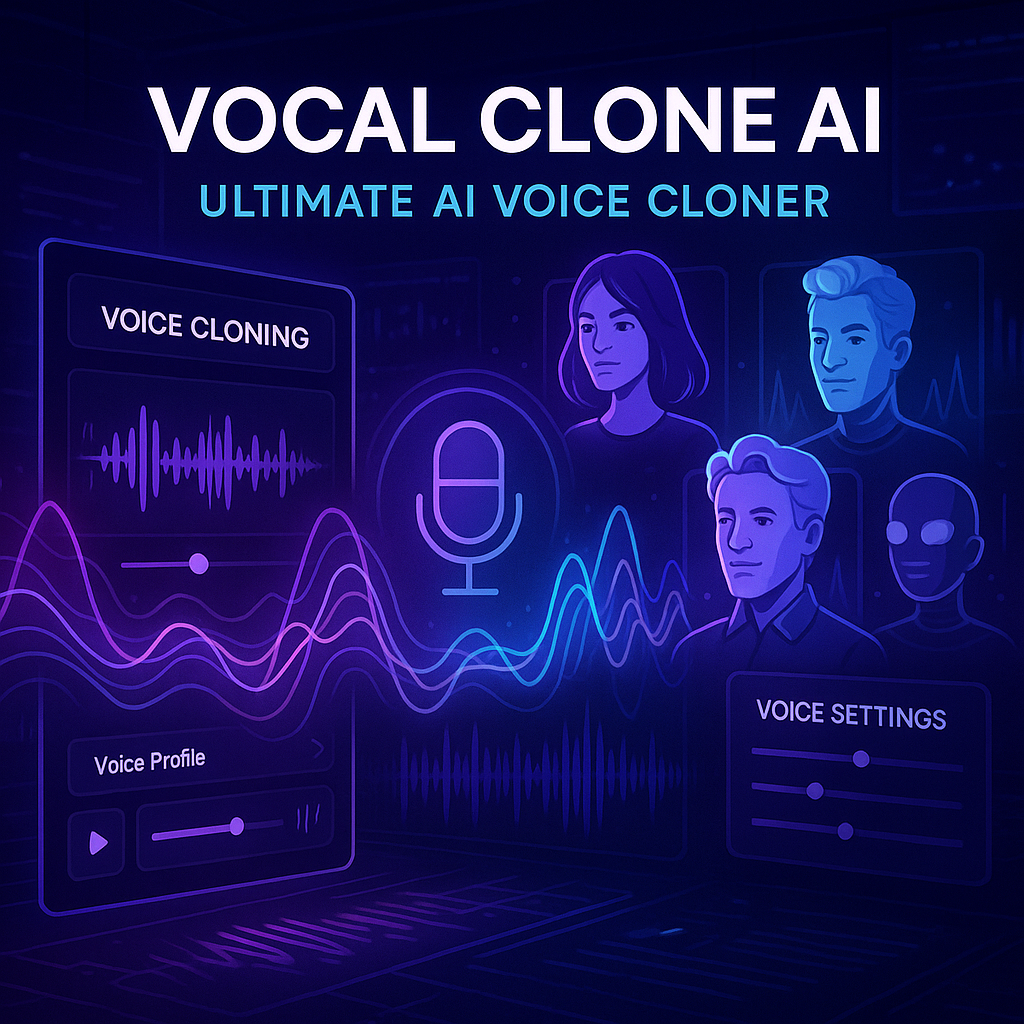Vocal Clone AI – Ultimate AI Voice Cloner Review
The era of synthetic voice generation is here, and Vocal Clone AI is leading the charge. Designed to deliver hyper-realistic voice cloning with minimal input, this platform is gaining traction among content creators, voiceover artists, businesses, and even tech enthusiasts.

So, is Vocal Clone AI – The Ultimate AI Voice Cloner as powerful and user-friendly as it claims? We tested it in real-world scenarios—from YouTube narration and podcast intros to audiobooks—and here’s everything you need to know.
What is Vocal Clone AI?
Vocal Clone AI is a cutting-edge text-to-speech and voice cloning platform. At its core, the platform allows you to:
Clone any voice using a short audio sample
Generate speech that mimics tone, pace, and vocal quirks
Create high-quality voiceovers, narration, or characters
Unlike older TTS engines that sounded robotic, Vocal Clone AI uses deep learning and neural networks to produce fluid, emotional, and human-like voices.
Key Features of Vocal Clone AI
Voice Cloning in Minutes
Users can upload a 30–60 second clean audio sample to generate a clone. The AI processes it in minutes and returns a fully cloned voice that mirrors the pitch, accent, rhythm, and tone.
Multi-Language Support
Vocal Clone AI supports dozens of languages and dialects, making it ideal for global content creators. You can even clone voices in one language and generate speech in another with the same vocal identity.
Custom Voice Controls
Once a voice is cloned, you can:
Adjust emotion (happy, serious, excited, etc.)
Change speaking speed or pauses
Add effects like echo, reverb, or whisper
Studio-Quality Output
Voices are exported in high-resolution audio files (WAV or MP3) suitable for broadcast, video editing, and commercial use.
Privacy & Permissions
The platform includes safeguards and licensing steps to ensure you own the rights to the voices being cloned—an essential feature to prevent misuse.
User Experience & Interface
The Vocal Clone AI interface is intuitive:
Dashboard shows all cloned voices
Editor panel allows text input with real-time preview
Export panel offers file format and emotion tuning
Voice management options include naming, tagging, and organizing clones
Even non-technical users can create professional-grade audio within minutes.
Real-World Applications
We tested Vocal Clone AI in several scenarios:
YouTube Voiceover: A cloned voice was used to narrate an explainer video with natural inflection and smooth transitions.
Audiobook Snippet: The AI handled punctuation and pauses almost flawlessly.
Customer Support Bot: A synthetic voice created with Vocal Clone AI replaced a robotic IVR system, sounding warm and polite.
Each use case highlighted the platform’s strengths in clarity, emotion, and pacing.
Pros and Cons
Pros:
Ultra-realistic voice quality
Fast cloning and speech generation
Emotional control for expression
Suitable for multiple industries (media, education, gaming)
Export in high-res formats
Secure cloning process with ethical guidelines
Cons:
Requires clear input audio for best results
Premium features (like advanced emotion tuning) are only on higher-tier plans
Not ideal for live or real-time synthesis (yet)
Licensing required for commercial impersonation (as expected)
Who Should Use Vocal Clone AI?
Content Creators & YouTubers: Voiceovers, narration, intros
Game Developers: Custom voices for characters
Podcasters & Audiobook Producers: Efficient narration
E-learning Creators: Professional course voiceovers
Businesses & Startups: Branded voice assistants or automated responses
Accessibility Providers: Personalized text-to-speech voices for individuals
Whether you're automating content or enhancing production, Vocal Clone AI offers scalable voice cloning solutions.
FAQs About Vocal Clone AI
Is voice cloning legal with Vocal Clone AI?
Yes—if you have legal rights or consent to clone the voice. Vocal Clone AI enforces ethical usage policies and content guidelines.
How long does it take to clone a voice?
On average, it takes 3–10 minutes to process a high-quality audio sample and return a usable cloned voice.
Can I monetize the content I create?
Absolutely. As long as the cloned voice is authorized, you can monetize it on YouTube, podcasts, courses, and more.
the pricing model?
Vocal Clone AI offers tiered plans:
Free trial with limited generations
Monthly subscriptions for hobbyists
Pro plans with commercial licensing and batch processing
Can it be integrated into other platforms?
Yes, Vocal Clone AI offers an API for developers to embed voice synthesis into apps, games, or services.
 (+91) 9871713861
(+91) 9871713861









